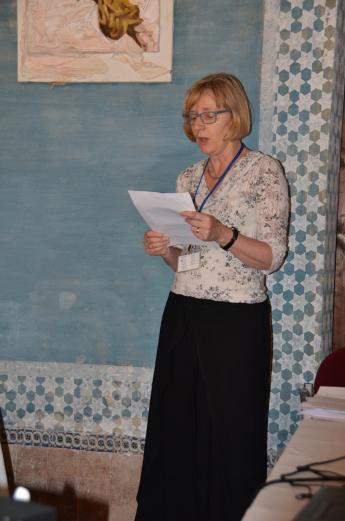Actualités Asociación Ibérica de Librerias Anticuarias
2015 - Seville
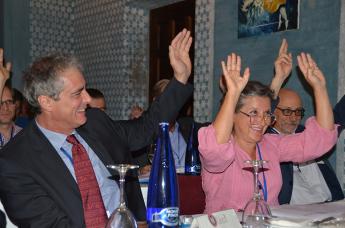
The International League of Antiquarian Booksellers unites 22 national associations, representing 35 countries and nearly 2000 professional rare book dealers worldwide. In its over 60 years of existence, ILAB has become a truly global network of the international antiquarian book trade. Once in a year the presidents of ILAB’s member associations, who form the governing body of the League, meet to discuss recent trends of the trade, the activities of ILAB within the past year along with initiatives and actions that shall be taken to promote the rare book business in the future.
On 1st October 2015 Gonzalo Fernandez Pontes, President of the Asociación Ibérica de Librerias Anticuarias (AILA) and Vice-President of ILAB, welcomed the delegates of the Presidents’ Meeting in Seville. The Spanish city on the river Guadalquivir is not only known to be one of the hottest European spots with a summer average high temperature of 35° C, but also one of the most beautiful places in Europe. The Roman and Medieval centre of Seville owns three UNESCO World Heritage Sites - the Alcázar Palace, the Cathedral, and the General Archive of the Indies. Only a short walk away from these famous sites the ILAB delegates met at the Palace of the Duke of Segorbe to hold their annual meeting.
The items on the agenda show that the rare book trade has to face severe problems and radical changes, but that there also promising perspectives and new paths to follow for better future partnerships and cooperation within the rare book world. The most important item on the agenda of each meeting is the report of the ILAB President. Read the detailed and excellent speech ILAB President Norbert Donhofer held yesterday to open the Presidents’ Meeting 2015 in Seville:
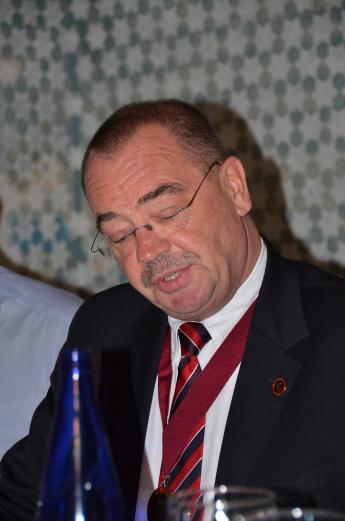
The President’s Report by Norbert Donhofer
The last President’s Report in Paris, April 2014, happened to be a short one, as only six months had passed since the President’s Meeting in Siena in September 2013. I am afraid that this report will be much longer as 18 months have passed meanwhile and this committee has had to deal with various foreseeable as well as unforeseeable issues.
One of the most important issues that has kept us extremely busy was the transformation of ILAB’s book-keeping into a modern system, and I can report happily that our treasurer, Bob Fleck, had not only accepted to take on this enormous challenge, but also that he succeeded. With the help of our Executive Secretary and an outside book-keeper, he has successfully combined and balanced all of our accounts in London and Copenhagen and had placed them into one financial accounting system (QuickBooksOnline). The day-to-day accounting of ILAB is now done by the Executive Secretary, an added responsibility for that position. The work is reviewed by the treasurer and an outside book-keeper. The Treasurer’s office now has access to online banking with the HSBC (London) and Sydbank (Copenhagen) with the ability to transfer funds. It was absolutely necessary to do that as it is probable that the forthcoming ILAB Treasurers will change more often than in the past, and they will henceforth find a modern and easy system that will allow them to be operational immediately. The first change of Treasurer is right ahead of us. When Bob Fleck was elected he did not hesitate to tell us that he would not see himself as a lifelong Treasurer. His resignation, however, came sooner than expected. Bob Fleck is now the proud President of the Historical Society of New Castle, Delaware, and he feels that working for the Historical Society as well as ILAB, while trying to be a successful bookseller, would be impossible. The Committee has accepted his resignation and I am glad to announce that he has helped us find a new Treasurer within a relatively short time. Thank you, Bob, for all the work you have devoted to ILAB, and welcome to Rob Shepherd! Rob is also the Treasurer of the ABA, and he will work closely together with our Executive Secretary and Vincent Cole, a professional book-keeper based in London. The Committee believes this to be a good solution as our accounts are also based in London. As per our bylaws, the Committee was able to nominate Rob, and by approving my report, you will also be approving his nomination.
I am also happy to be able to report that the financial situation of ILAB is excellent, albeit our various and permanently increasing activities require more investments than in the past, but I can ensure you that this Committee is extremely careful when spending ILAB’s money. Bob Fleck will report about the budgets of ILAB and the ILAB-Breslauer Prize later in detail.
Another important issue that bothers us permanently is the ongoing reports and rumors about thefts and forgeries, and also the legal consequences of these criminal actions. It was only a short time after this Committee was elected that Italian authorities started to confiscate books suspected to have been stolen at the Girolamini Library in Naples, although the incriminated booksellers were able to clearly prove when, where, and from whom they had purchased these items. ILAB protested sharply, and as a consequence of our open letter to the Italian prosecutors I was invited to Naples where I tried, together with Fabrizio Govi, ALAI Past-President, and Dott. Francesco Salamone, the ALAI attorney, to convince the Italian authorities that their behavior was simply wrong. I again offered ILAB’s expertise in assisting them whenever our help would be needed but it seems clear that they will never ask for help. However, they seem to have understood my arguments, and there are no current news about the Girolamini affair. Nevertheless, it was annoying to find that Marino Massimo de Caro, the former director of this library, although sentenced to seven years in prison, started to send emails to the Committee, to me personally, and to the ALAI Committee, stating that he was totally innocent. We asked the attorney of ALAI, Dott. Francesco Salamone, to protest and send a letter to the Italian authorities, and we haven’t heard from De Caro since.
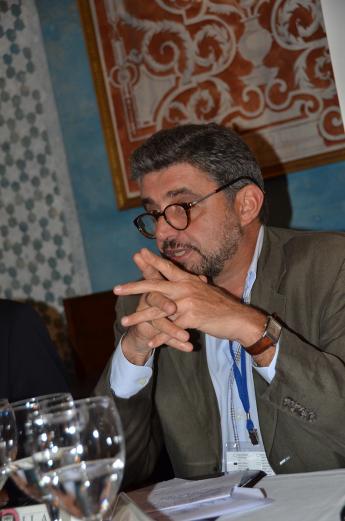
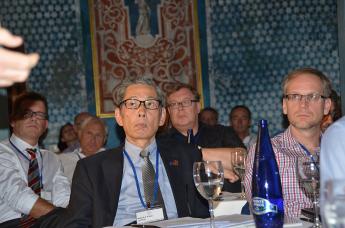
We were able to puzzle together a list of the books which were withdrawn from auction at Zisska & Schauer, Munich and which were from the Girolamini Library. This list had been sent to all of our members. I do not hesitate to express my curiosity about the fact that the auction house of Zisska & Schauer – heavily involved in this case - was of little help. The reason why they had behaved so remains unknown.
I was invited to attend at a conference held at the British Library in June of 2015, on “The Written Heritage of Mankind in Peril: Theft, Retrieval, Sale and Restitution of Rare Books, Maps and Manuscripts”. This conference dealt mainly with the thefts in the Royal Libraries of Denmark and Sweden, and their legal consequences.
Arnoud Gerits attended a similar conference and gave a presentation for ILAB at The Hague in March 2015. In his presentation he stressed the need for more and closer collaboration and communication between institutional authorities, civil authorities and ILAB in a combined effort to prevent illegally obtained cultural goods (books in this particular case) from circulating in and being sold through the trade.
It was around the Paris Congress in 2014 that a new scandal was brought to light, although it had been long suspected that “Aristophil” had built up a sort of “Ponzi-Scheme”. French authorities have stated that it will take about three to five years to clear up this mess, and there is no wonder about that as we are talking about thousands of cheated investors, more than one hundred thousands of autograph letters and manuscripts, and an amount of some 800 million Euros. The owner/director of Aristophil, Gérard Lheritier, has been arrested meanwhile, and investigations have already started against some French booksellers. I am afraid that this case will keep us busy for many years.
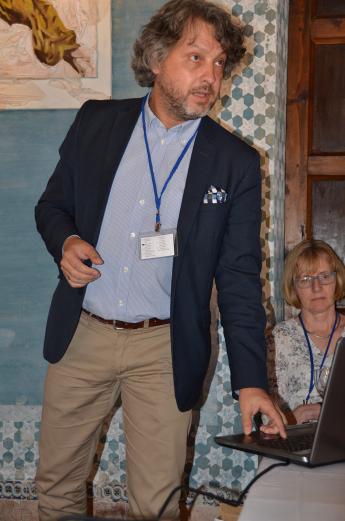
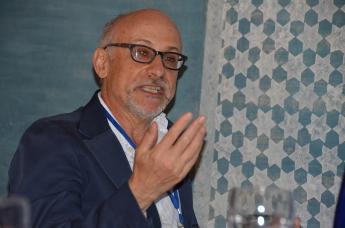
Facing all these issues, facing also the fact that all of these problems were and still are damaging the reputation of ILAB, our profession, and the majority of our affiliates, who are trying daily to convince their customers, that it is us, ILAB-booksellers, whom they can trust. Our Spring Committee Meeting was set in Milan at the time of the Milan book fair instead of New York as scheduled, in support of our Italian colleagues, and also to be able to organize a round table about thefts and forgeries. Although none of the Italian prosecutors we had invited showed up, we did welcome some important persons: Giuseppe Calabi, attorney at law in Milan, Felix de Marens Oyens, former head of Christie’s and director of the Breslauer Foundation, Gianni Bertolino, the only Italian official who attended, as well as others. The results of this meeting, as well as of the London conference, might be the basis of ongoing discussions and workshops.
Fortunately, I can report about some other, much more pleasant activities. I had been invited to attend a conference about the Italian bookseller Giuseppe Martini in Lucca, Tuscany, in October 2014. Giuseppe Martini was born in Lucca, moved later on to New York, and retired in Lugano, Switzerland. He was among the first Italian booksellers who initiated the building up of Italian book collections in the US, and he was, by all fair means, a gifted antiquarian bookseller. Alas, I have to say that by modern standards, he would be considered today a criminal because none of the invaluable manuscripts and early printed books he exported from Italy had anything coming close to an export license, and/or details of a provenance. Times have changed!
Our “Far-East-Member”, the ABAJ, celebrated their 50th anniversary in December 2014. I had sent a congratulation note upon this occasion but the festivities did not end before March 2015. The ABAJ organized a more official celebration and an international book fair at the beginning of March, and I took the opportunity to attend the opening of the fair and address ILAB’s good wishes for their anniversary.
I do not want to bother you with the details of the many smaller matters we have dealt with, and will therefore simply list them: the Presidents of Honor have been added to the mailing list of the Committee; a photo album of the Paris Congress was done and distributed; a printed Newsletter was published and sent to the affiliates in November 2014; the new ILAB Directory was published in January 2015; I met with some antiquarian booksellers of Croatia in Zagreb last year to discuss the foundation of a Croatian Antiquarian Booksellers Association, but I cannot report about any further substantial results in this matter; we are keeping a close relationship with CINOA, and former Committee member Brigitta Laube keeps on attending the meetings of CINOA for us; Arnoud Gerits attended a CINOA meeting of a newly formed EU lobbying committee. Arnoud reported later that it was not really necessary to attend these meetings in the future, as their concerns are quite different from ours, and we specifically don’t want to be mixed with them as there might be a risk of our VAT rate being raised; the project on bibliophily has been stopped as the texts we had received so far were of different levels. The incoming articles will be published on the website; I have had some talks with Jean-Marc Chatelain, the executive secretary of the AIB (Association Internationale de Bibliophilie), and we have agreed to work closer together and to check dates of Congresses and Meetings to avoid clashes.
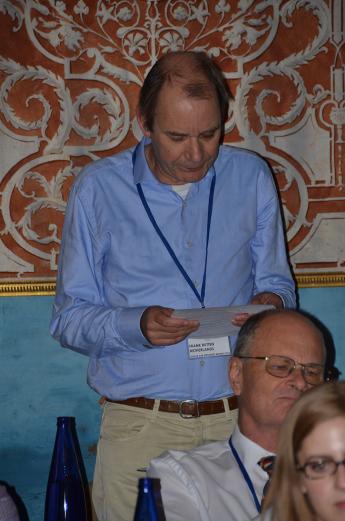
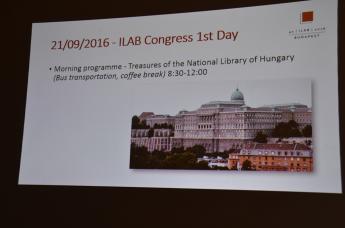
One of the results of the London conference was certainly that there is a need to work closer together with IFLA, the international association of librarians. I could feel the change in behavior among the librarians during the conference, and one of the most important librarians, Denis Bruckmann (Bibliothéque Nationale de France), expressed the change drastically: “I am fed up with hiding thefts that have occurred and are occurring in our libraries! That’s what we had been doing for decades. We have nothing to hide, and we have to go public! That’s the only chance to recover stolen items”. Subsequently, I have exchanged many emails with important librarians: Denis Bruckmann (BNF), Christian Jensen (British Library), Ivan Boserup (Royal Library, Copenhagen), Jerker Ryden and Greger Bergvall (Royal Library, Stockholm). I have also exchanged my thoughts with highly qualified attorneys, who had also attended this conference: Norman Palmer (London), Keun-Gwan Lee (Seoul), Giuseppe Calabi (Milan), Jutta von Falkenhausen (Berlin), Sibel Özel (Istanbul), and Gert-Jan van den Bergh (Amsterdam); and, of course, with distinguished persons from the trade: Meg Ford (Christie’s), Richard Aronowitz-Mercer (Sotheby’s), Monica Dugot (Christie’s) and Stephan Loewentheil (19th Century Bookshop). After having collected their ideas I sent a letter to the President of IFLA presenting the idea of creating a Committee consisting of three members of IFLA and ILAB each. This Committee should meet at least once a year, and, if needed, more often, to discuss recent problems. This letter was well received, and the answer was promising, but, unfortunately, the President of IFLA was an outgoing one and could not make any serious promises. I will keep on working on this idea.
Another idea following the London conference relates to the “Stolen Book Databases”. ILAB is running a quite successful database – the librarian of the BNF, Denis Bruckmann, expressed that in London, which was no wonder as our database helped within only two days to recover some valuable, but stolen, prints of his library. There is also “The Art Loss Register”, a professionally run but money costing database. The chairman of ALR, Julian Radcliffe, met with me in Vienna some weeks after the conference in London, and we have been talking about the possibility of a merger of the two databases. Julian Radcliffe has meanwhile sent a proposal to the Committee, and our Security Officer Gonzalo Pontes and Committee Member Stuart Bennett have checked this proposal carefully. Gonzalo and Stuart will explain the pros and cons in detail soon.
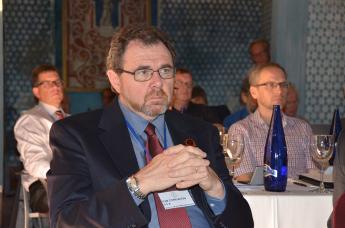
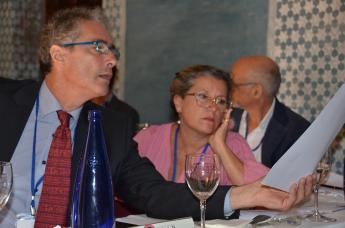
You will remember that Udo Göllmann, representative of ABEbooks, gave a presentation during the Presidents Meeting in Paris. Past-President Tom Congalton, Barbara van Benthem, Jim Hinck and I had been negotiating with ABEbooks since 2013 about their offer to make ILAB-booksellers more visible on ABEbooks. They changed their first proposal several times, and Udo Göllmann’s presentation about an “ILAB landing-page” etc. made definite sense. However, the following discussion appeared to be quite controversial, and the voting was all but not unanimous. The Committee, however, has tried to follow the vote of the Presidents, encouraging us to further negotiations with ABEbooks. Soon after the first talks, rumors around Amazon, the owner of ABEbooks and ZVAB, started, and these unpleasant reports didn’t stop after some days or weeks but went on for months. Some Presidents expressed their rising concerns about our deal with ABEbooks, and in July of 2014 the Committee decided to postpone our talks with them. ABEbooks has meanwhile kept on talking to several of our members, and the ABAA has agreed to work closer together with them. The ABA und the VDA are in negotiations with ABEbooks, but this Committee has still the feeling that it is not the right time to restart our talks with them.
The internship program keeps on running, and another student from the Moscow State University of the Printing Arts will travel to the US soon to work for some weeks at “Between the Covers”. The Russian Association had informed me about another student seeking for an internship abroad. This student has excellent Korean language skills and I have therefore asked them to contact the President of the ABAK.
I had been wondering for quite some time about the fact that antiquarian booksellers did not participate in UNESCO’s “World Book and Copyright Day” which is annually celebrated in many countries on April 23rd. When I mentioned that during the Paris Congress it still seemed like a vague concept, but Committee Member Sally Burdon and our Web-Editor, Barbara van Benthem were thrilled. In the following months the two ladies created a concept allowing antiquarian booksellers to join this worldwide event. I do not have the slightest idea of how many emails were exchanged, and I was sometimes really astonished about the energy Sally and Barbara devoted to this new activity, but what is now clear to me is the fact that their enthusiasm excited many of our affiliates. The first edition of ILAB’s World Rare Book Day was a fabulous success and the 32 pop-up book fairs around the world attracted customers as well as media. During the 24 hours event hundreds of reports were sent to reporters and newspapers, thousands of images, videos and interviews were available, and an accompanying blog was well attended. Customers could also support literacy and fill empty bookcases, and people did not hesitate to do so. Finally we were able to wire the donations gathered by the pop-up exhibitors, for an amount of nearly 10.000 € to UNESCO, an amount that has been used by UNESCO to buy schoolbooks for South-Sudan. The preparations for the second edition of the WBCD are meanwhile on track, and we trust that on April 23, 2016, even more booksellers will participate.
Last but not least, I need to remind you all that what ILAB is today is the result of what your predecessor presidents decided during General Meetings since 1947. Our meetings continue to build upon the past to improve our future. But that does not mean that proposals adopted fifty years ago have become obsolete (For example the definition of what is an ILAB fair).
I do not want to end my report without expressing my thanks to all my Committee members without whom none of these tasks could have been achieved, as well as to many of the Presidents of our member associations. We need your feedback and your input to keep on working for the benefit of the League.
Picture Galleries
>>> ILAB Committee Meeting 2015
>>> Presidents’ Meeting 2015
>>> Pictorial tour through the libraries of Seville
>>> Learn more about ILAB
>>> Get in contact with the ILAB Committee
